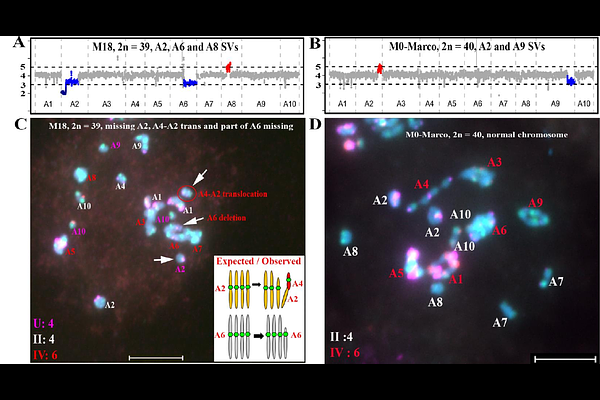Tetraploid turnips (Brassica rapa ssp. rapa) are highly tolerant of tetravalent formation and aneuploidy

Tetraploid turnips (Brassica rapa ssp. rapa) are highly tolerant of tetravalent formation and aneuploidy
Lv, Z.; Schneider-Huether, I.; He, F.; Mason, A. S.
AbstractPrior to 1980, experimental induction of polyploidy (chromosome doubling) led to the release of several tetraploid Brassica rapa ssp. rapa as fodder turnip cultivars. Most experimentally induced polyploids are meiotically unstable and show reduced fertility. However, we hypothesized that based on the requirement to produce large amounts of commercial seed to sell to farmers, these turnip lines should have managed to restore fertility and stabilize meiosis. We collected and tested all B. rapa listed as or referred to as tetraploid from the IPK Gatersleben, CGN Wageningen and Nordgen germplasm banks, and subsequently investigated chromosome karyotypes, meiotic chromosome behaviour and fertility in confirmed tetraploid turnip accessions, using a combination of resequencing and fluorescent in situ hybridisation. Contrary to our expectations, all accessions showed unstable meiosis: the average tetravalent frequency per meiosis per plant ranged from 4.8 to 6.4 per line, and these tetravalent associations also persisted from diakinesis to metaphase I. Using chromosome-specific fluorescence in situ hybridisation probes, we found that most chromosomes showed similar frequencies of tetravalent formation except for chromosomes A03 and A06, which predominantly formed tetravalents (>90%). Of the 21 individuals sequenced (one per accession), approximately half (9/21) were aneuploid (loss or gain of a whole chromosome), and two displayed additional chromosomal rearrangements. We nevertheless observed no significant phenotypic abnormalities or reductions in fertility (although all accessions were self-incompatible). Our findings indicate that stabilizing meiosis may not always be necessary to produce relatively fertile and homogeneous outcrossing polyploid populations.